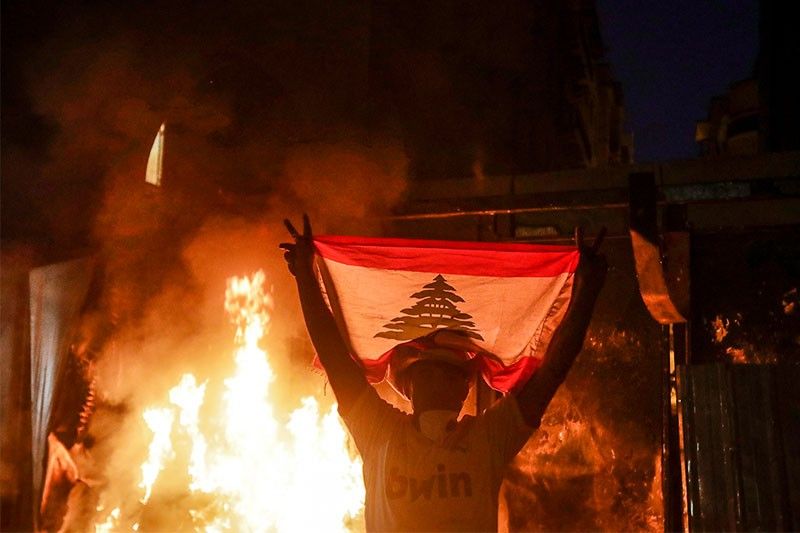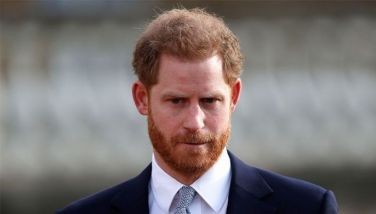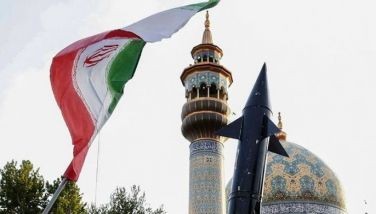Week after blast, Lebanon street at war with its leaders

BEIRUT, Lebanon — Lebanon on Tuesday marked a week since its worst-ever peacetime disaster with a mix of grief and rage, as survivors remembered the dead and protesters vowed to bring down the political elite.
The resignation of Lebanon's government the previous day did little to extinguish the anger caused by the August 4 blast at Beirut port that killed 171 people and disfigured the country's capital.
At 6:08 pm in Beirut (1508 GMT) Tuesday, church bells rang and mosques called for prayer to mark the precise moment that a portside fire ignited a vast stock of ammonium nitrate fertiliser, sparking a huge explosion that was felt as far away as Cyprus.
The fireball and subsequent shockwave, caught in dramatic videos posted on social media, wrought devastation across entire neighbourhoods of Beirut.
A week later, the blast that left 6,000 people injured and made an estimated 300,000 people temporarily homeless looked like a potential watershed in Lebanon's troubled political history.
On Tuesday, Ali Noureddin joined thousands of people to march solemnly by the wreckage of Beirut port, where his brother Ayman had been stationed as soldier when the blast went off.
"My brother died because of state negligence and corruption," he said, holding a picture of his late brother, who was 27.
Ali dismissed the resignation of Hassan Diab's government on Monday as insignificant unless it were followed by the wholesale removal of Lebanon's hereditary political elite.
"Change will only happen when the entire regime changes," he said, holding back tears. "But I hope all these young people here and my brother's death can bring about change."
In his resignation speech, the 61-year-old Diab cast himself as a champion of the struggle against corrupt political overlords, despite the fact many see him as a puppet rather than a victim.
Some saw his departure as a victory for the protest movement that forced out the previous government last year.
But others warned that given the power of Lebanon's factions and clans, the same old faces may be back before too long.
"It's a long fight that won't end in a month or two," said Hussein El Achi, an activist and lawyer defending the protest camp.
"But (the political elite) are weak, they have never been weaker, even among their own people," he said.
Protests continued for the fourth consecutive night Tuesday, as dozens of demonstrators clashed with security forces and tried to break down barriers leading to the parliament in central Beirut.
The Lebanese Red Cross said 10 people had been taken to hospital while 32 were treated at the scene.
Search for next PM
The blast rocked a country already on its knees, with an economic collapse sending poverty levels soaring even before the coronavirus pandemic hit.
Some observers argue that deep public anger over the tragedy will reduce Lebanese politicians' room for manoeuvre as foreign pressure grows to pass reforms as a condition for a bailout.
"They will find it very difficult to avoid the kind of structural reforms that the international community has made a precondition for any aid," said political science professor Bassel Salloukh of the Lebanese American University.
France has taken the lead in the international emergency response, organising an aid conference which raised a quarter of a million euros.
President Emmanuel Macron visited blast-ravaged neighbourhoods of Beirut two days after the disaster, adopting a tough tone with Lebanese officials and warning that they needed to strike "a revamped pact with the Lebanese people".
For now Diab's team will continue in a caretaker capacity, but negotiations were underway for a successor.
According to the Al-Akhbar daily newspaper, veteran diplomat Nawaf Salam is favoured by Paris, Washington and Riyadh, three of the key outside power brokers in Lebanon.
Iran, sponsor of Lebanon's dominant Hezbollah movement, also appeared to be on board with such a scenario, which would see Salam head up a neutral government not hostile to the Shiite group.
It was not clear how other factions viewed that solution.
Food 'catastrophe' looms
In the blast zone, the increasingly hopeless search for survivors continued, but rescue teams were only pulling lifeless bodies from the rubble.
The UN refugee agency said that 34 refugees were among the dead.
The blast ripped the sides off towering grain silos that shielded part of the city from the shockwave. But the blast spilt thousands of tonnes of grain, vital to the import-dependant country's food security.
On Monday, the head of the World Food Programme, David Beasley, said Lebanon needed all the help it could get because 85 percent of Lebanon's food used to come in through the port.
He warned that unless port operations resumed quickly, Lebanon would be without bread in two weeks.
Further adding to its woes, the country on Tuesday recorded its highest-yet daily number of deaths and new infections from the novel coronavirus, with seven fatalities and 309 new cases.
Health officials have warned that the chaos caused by the blast risked leading to a spike in infections.
The head a major public hospital warned that the next few days would be critical.
"The events of the previous week have, understandably, shifted attention away from the pandemic," Firass Abiad said on social media.
But, he said, "we cannot afford to allow the virus to go unchecked."
The powerful explosions that rocked the port of Beirut on Tuesday left "people dead and injured", the Lebanon's National News Agency reports
Georges Kettaneh, the president of the Lebanese Red Cross, referrs to "hundreds of wounded" in a statement on Lebanese LBC television, adding: "We are overwhelmed by phone calls."
Lebanon’s Prime Minister Hasan Diab has declared Wednesday a day of mourning, and President Michel Aoun called for "urgent" defence council talks. — AFP
The Lebanese judge leading an investigation into last year's devastating Beirut port blast was forced to suspend his work Tuesday after what human rights groups condemned as an attempt by politicians to evade justice.
It is the second time that judge Tarek Bitar has had to suspend the probe in the face of lawsuits filed by former ministers he had summoned on suspicion of negligence, and it comes amid growing calls from top officials, including Hezbollah chief Hasan Nasrallah, for him to be replaced.
Bitar's predecessor, Fadi Sawan, was forced to suspend his probe for the same reason before he was finally removed in February in a move widely condemned as political interference. — AFP/Rouba El Husseini
Lebanese leaders have promised to form a new government within two weeks, visiting French president Emmanuel Macron said Tuesday after talks with political blocs who designated a new prime minister a day earlier.
"What I have asked for, what all political parties without exception have committed to this evening right here, is that the formation of this government will not take more than 15 days," Macron said in a speech.
He said the cabinet would be comprised of "competent personalities" and would be an "independent" entity with the backing of political parties. — AFP
UN human rights experts on Thursday demanded a swift, independent investigation into the catastrophic Beirut explosion, citing deep concern about irresponsibility and impunity in Lebanon.
The group also called for a relatively-rare special debate at the United Nations Human Rights Council this September.
UN experts do not speak for the United Nations but report their findings to it. — AFP
The massive blast at Beirut port on August 4 caused more than $15 billion in damages, Lebanese President Michel Aoun says.
"Preliminary estimates of the losses suffered following the port explosion top 15 billion dollars," he was quoted as telling Spain's King Felipe in a phone call, in a message on the presidency's Twitter account. — AFP
The death toll from Beirut's massive August 4 explosion has climbed to 171, a health ministry spokesman told AFP on Tuesday.
The new figure, up from 160, came exactly one week since the mega-blast ravaged swathes of the Lebanese capital, wounding more than 6,000 and temporarily displacing 300,000 people from their homes. — AFP
- Latest
- Trending





























